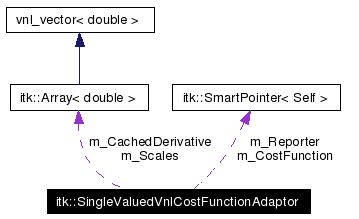
#include <itkSingleValuedVnlCostFunctionAdaptor.h>
Collaboration diagram for itk::SingleValuedVnlCostFunctionAdaptor:

This class returns a single valued.
Definition at line 36 of file itkSingleValuedVnlCostFunctionAdaptor.h.
|
|
Derivatives of the SingleValuedCostFunction Definition at line 54 of file itkSingleValuedVnlCostFunctionAdaptor.h. |
|
|
InternalGradientType typedef. Definition at line 48 of file itkSingleValuedVnlCostFunctionAdaptor.h. |
|
|
InternalMeasureType typedef. Definition at line 45 of file itkSingleValuedVnlCostFunctionAdaptor.h. |
|
|
InternalParametersType typedef. Definition at line 42 of file itkSingleValuedVnlCostFunctionAdaptor.h. |
|
|
Type of the SingleValuedCostFunction value Definition at line 57 of file itkSingleValuedVnlCostFunctionAdaptor.h. |
|
|
Parameters of the SingleValuedCostFunction Definition at line 51 of file itkSingleValuedVnlCostFunctionAdaptor.h. |
|
|
Scales typedef Definition at line 60 of file itkSingleValuedVnlCostFunctionAdaptor.h. |
|
|
Constructor with size |
|
||||||||||||
|
This AddObserver method allows to simulate that this class derives from an itkObject for the purpose of reporting iteration events. The goal of this method is to allow ITK-vnl optimizer adaptors to get iteration events despite the fact that VNL does not provide callbacks. |
|
||||||||||||||||
|
Delegate computation of value and gradient to the costFunction. |
|
||||||||||||
|
Convert external derviative measures into internal type |
|
|
Delegate computation of the value to the CostFunction. |
|
|
Return the value of the last evaluation to the value of the cost function. Note that this method DOES NOT triggers a computation of the function or the derivatives, it only returns previous values. Therefore the values here are only valid after you invoke the f() or gradf() methods. |
|
|
Return the value of the last evaluation to the value of the cost function. Note that this method DOES NOT triggers a computation of the function or the derivatives, it only returns previous values. Therefore the values here are only valid after you invoke the f() or gradf() methods. |
|
|
Return the value of the last evaluation to the value of the cost function. Note that this method DOES NOT triggers a computation of the function or the derivatives, it only returns previous values. Therefore the values here are only valid after you invoke the f() or gradf() methods. |
|
|
Get the CostFunction deriving from SingleValuedCostFunction Definition at line 71 of file itkSingleValuedVnlCostFunctionAdaptor.h. |
|
|
Set/Get Negate cost function. The purpose of this boolean flag is to make possible to take certain VNL optimizers that are only minimizers, and use them for maximizing functions. When the boolean flag is set to true, the values returned by GetValue in the internal ITK cost function will be multiplied by -1 before returning it in the f() function. Similar operations will be done for the gradf() and compute() methods. When the boolean flag is set to false, then the values returned by the ITK cost function will be passed unchanged to the VNL optimizers. |
|
||||||||||||
|
Delegate computation of the gradient to the costFunction. |
|
|
Set/Get Negate cost function. The purpose of this boolean flag is to make possible to take certain VNL optimizers that are only minimizers, and use them for maximizing functions. When the boolean flag is set to true, the values returned by GetValue in the internal ITK cost function will be multiplied by -1 before returning it in the f() function. Similar operations will be done for the gradf() and compute() methods. When the boolean flag is set to false, then the values returned by the ITK cost function will be passed unchanged to the VNL optimizers. Definition at line 106 of file itkSingleValuedVnlCostFunctionAdaptor.h. |
|
|
Set/Get Negate cost function. The purpose of this boolean flag is to make possible to take certain VNL optimizers that are only minimizers, and use them for maximizing functions. When the boolean flag is set to true, the values returned by GetValue in the internal ITK cost function will be multiplied by -1 before returning it in the f() function. Similar operations will be done for the gradf() and compute() methods. When the boolean flag is set to false, then the values returned by the ITK cost function will be passed unchanged to the VNL optimizers. Definition at line 105 of file itkSingleValuedVnlCostFunctionAdaptor.h. |
|
|
This method is intended to be called by the derived classes in order to notify of an iteration event to any Command/Observers |
|
|
Set the CostFunction deriving from SingleValuedCostFunction Definition at line 67 of file itkSingleValuedVnlCostFunctionAdaptor.h. |
|
|
Set/Get Negate cost function. The purpose of this boolean flag is to make possible to take certain VNL optimizers that are only minimizers, and use them for maximizing functions. When the boolean flag is set to true, the values returned by GetValue in the internal ITK cost function will be multiplied by -1 before returning it in the f() function. Similar operations will be done for the gradf() and compute() methods. When the boolean flag is set to false, then the values returned by the ITK cost function will be passed unchanged to the VNL optimizers. |
|
|
Set current parameters scaling. |
 1.3.5 written by Dimitri van Heesch,
© 1997-2000
1.3.5 written by Dimitri van Heesch,
© 1997-2000